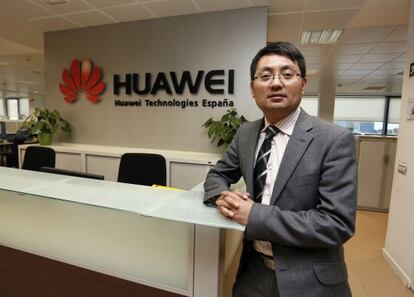“We have nothing to do with the Chinese government or the army”
Walter Ji, CEO of Huawei in Spain and Portugal, denies accusations of dumping and software piracy

Walter Ji is the chief executive officer of Huawei in Spain. The Chinese company has become one of the global leaders in telecommunication networks and is now trying to muscle its way deeper into the manufacturing of smartphones and tablets. However, Huawei's main concern at present is to present a good image of the company after China received a warning from the European Commission about illegal subsidies to Huawei and its telecommunication network rival ZTE, and Huawei was itself accused of dumping in Europe.
Question. How does a multinational company look on a country in crisis such as Spain?
Answer. The Spanish market is one of the five most important for us in Europe. Of course, the crisis has affected our business. But we have a long-term commitment to Spain and have been here 11 years.
Q. The group increased its global sales last year by eight percent and its earnings by 33 percent. What about Spain: better or worse?
A. Revenues grew but by less than half of the average for the company. We don't reveal our earnings, although in Spain they're in middle range level.
Q. Telecommunications has started rolling out Fiber To The Home networks (FTTH). What's Huawei's share of this cake?
A. For commercial reasons we cannot provide that information. Fiber optic is an important technology and we are working with our clients.
Q. But it seems your competitors are hitting hard. For example, Jazztel, which is one of your best clients, has plumped for ZTE. And Alcatel Lucent, which works for Telefónica, is pushing for the contract with Vodafone.
We don't do dumping. Just ask Telefónica or Vodafone about us"
A. We have worked with Jazztel for eight years, offering DSL technologies, and I respect its decision as regards the fiber optic network. Telefónica is a magnificent customer. With Vodafone we have just signed a contract for the maintenance of its cellphone and fixed-line telecommunications networks.
Q. Huawei, like other telecommunication networks suppliers, is getting increasingly more involved in the financing side of the businesses. Are you becoming the banks of the telecoms operators?
A. Our business consists of supplying goods and services to the telecommunications sector, and depending on the project in question, we also offer some financial solutions. But that is not the object of our business. We have made enormous investments in Spain of over 20 million euros in the past three years.
Q. The rollout of Long Term Evolution (LTE), the standard for fourth generation cellphone services, has started. It would seem there is an opportunity for Huawei in the networks of Orange, Vodafone and Telefónica.
A. That is something for the operators themselves to announce. The LTE is important for the technological advancement of mobile services and for the sector.
Q. The group has just announced it is going to create 7,000 jobs in Europe. And in Spain?
A. The rollout of LTE is a good opportunity to create employment. But we can't say by how much until we know the rollout operations of the operators. We are committed to jobs. We have more than 1,000 employees and we have just hired 104 people from Vodafone.
Q. Huawei has become the fourth largest manufacturer of smartphones in the world. But your presence here is much smaller.
A. Smartphones are a crucial business for Huawei and it grew more than any other last year. In Spain we are growing at a rate of close to 30 percent.
Q. Can your smartphones compete with monsters such as the Samsung Galaxy S4 and the iPhone 5? Your star models such as Ascend P2 are not sold in Spain.
We are launching the P6, the world's thinnest cellphone"
A. We announced the commercial launch of the P2 globally at the Mobile World Congress held in Barcelona this year. It works with LTE and that is why we haven't launched it yet in Spain, but we will in the third quarter. We are going to launch more top-of-the-range smartphones. And we are not cheaper. Our strategy is the offer the best quality at an accessible price. In June, we launched the P6, the thinnest cellphone in the world.
Q. Android has emerged as the clear winner in the battle for dominance in operating systems for cellphones.
A. Currently, the Android platform is the biggest. But some clients prefer Windows and Firefox has just arrived and perhaps the whole scenario will change. That is why we believe it is better to diversify our operating systems in order to better exploit the opportunities available.
Q. And tablets?
A. We have brought out the Media Pad 10, and we are working with retailers to market it.
Q. The European Union has opened proceedings against you for dumping. And you have been accused of receiving subsidies from the Chinese government.
A. We are disappointed with the news that has come out. Our strategy is based on providing high-end solutions at accessible prices, and that is why our customers choose us. We don't receive subsidies from the Chinese government, and neither have we been dumping in the European market. If you compare what happens in Europe with the United States, you can see that European consumers enjoy much more accessible products and a higher quality of service than US customers.
Q. Are you worried about a possible reaction to this from one of the Spanish operators?
A. Our customers know Huawei's way of doing things perfectly well. Ask Telefónica or Vodafone what they think of Huawei and why they chose us. We have gone about our business in the EU competing in a fair way.
Q. In the United States, they're also wary of your links to the Chinese army. They said the founder of the company, Ren Zhengfei, was an officer in the army.
A. We have no relationship with the Chinese army. Huawei was established in 1987 and we are a totally private-sector company. Ren Zhengfei served for a few years in the army, but that is quite normal. There are a lot of cases of directors on big companies in Europe and in the United States who have worked for the army for a number of years.
Tu suscripción se está usando en otro dispositivo
¿Quieres añadir otro usuario a tu suscripción?
Si continúas leyendo en este dispositivo, no se podrá leer en el otro.
FlechaTu suscripción se está usando en otro dispositivo y solo puedes acceder a EL PAÍS desde un dispositivo a la vez.
Si quieres compartir tu cuenta, cambia tu suscripción a la modalidad Premium, así podrás añadir otro usuario. Cada uno accederá con su propia cuenta de email, lo que os permitirá personalizar vuestra experiencia en EL PAÍS.
¿Tienes una suscripción de empresa? Accede aquí para contratar más cuentas.
En el caso de no saber quién está usando tu cuenta, te recomendamos cambiar tu contraseña aquí.
Si decides continuar compartiendo tu cuenta, este mensaje se mostrará en tu dispositivo y en el de la otra persona que está usando tu cuenta de forma indefinida, afectando a tu experiencia de lectura. Puedes consultar aquí los términos y condiciones de la suscripción digital.









































